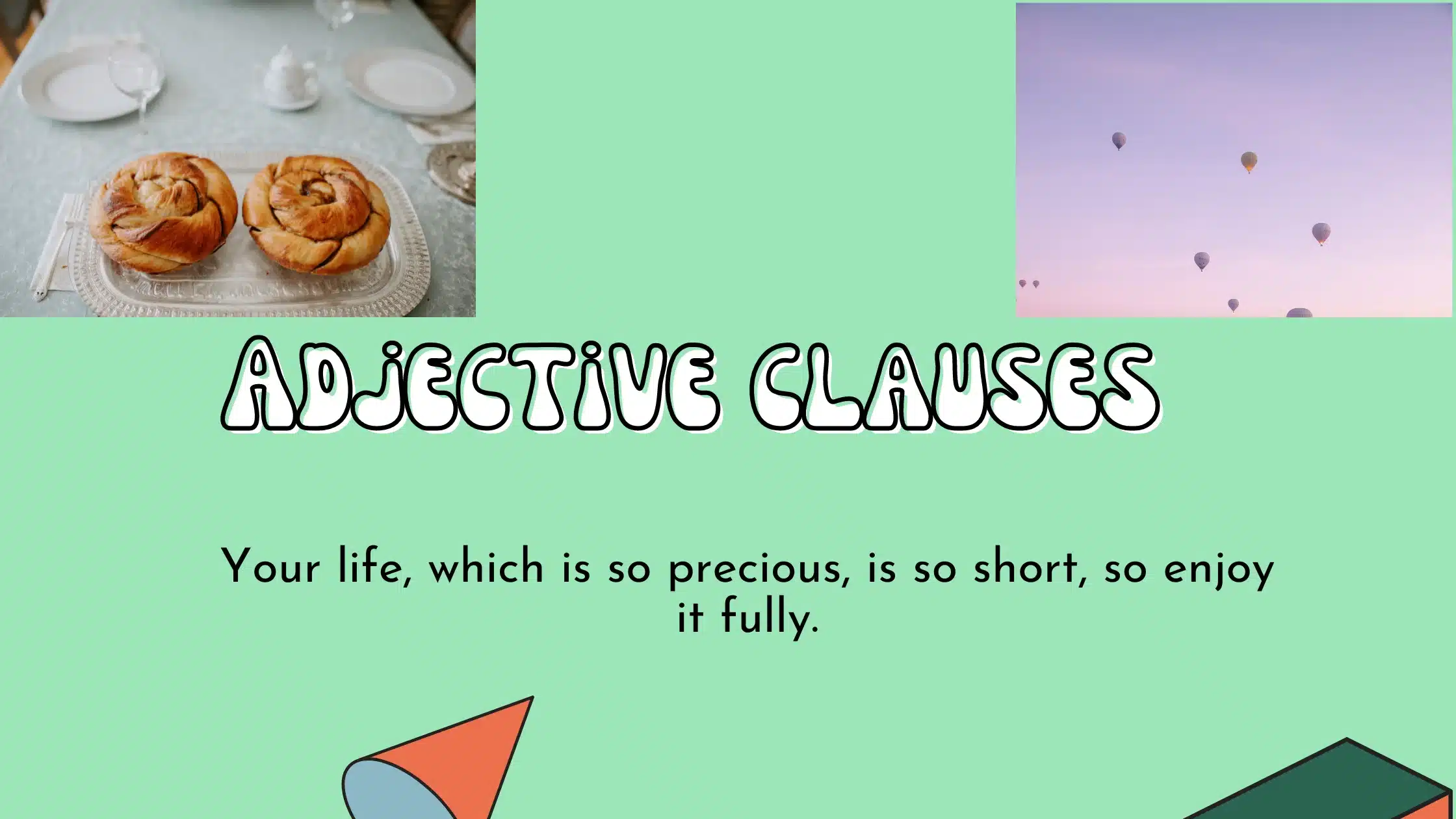An adjective clause, also known as a relative clause, is a group of words that functions as an adjective and provides more information about a noun or pronoun in a sentence. It starts with a relative pronoun (such as who, whom, which, whose, or that) or a relative adverb (such as when, where, or why).
Here are some examples of adjective clauses:
- The book that I borrowed from the library is very interesting.
- The woman, who lives next door, is a doctor.
- Do you remember the day when we went to the beach?
More Adjective Clauses Examples
See the following adjective clauses in the sentences, which are underlined.
- The car that I borrowed from my friend needs an oil change.
- The man whose car was stolen reported it to the police.
- Is the woman who is wearing a yellow dress your sister?
- The store where I bought my shoes was having a sale.
- The cake, which was made by my grandmother, was delicious.
- Can you lend me the book that you have just finished reading?
- The restaurant where we had dinner had excellent service.
- The hotel, which is located on the beach, has a beautiful view.
- Where did you park the bike which was stolen last night?
- Who’s the boy who won the race ?
In the first example, “that I borrowed from the library” is an adjective clause that provides additional information about the noun “book.” Similarly, “who lives next door” is an adjective clause that describes the noun “woman.” Likewise, “when we went to the beach” is an adjective clause that specifies the noun “day.”
Adjective Clause Functions
An adjective clause, also known as a relative clause, functions as follows:
Adjective Clause as a Noun Modifier
The main function of an adjective clause is to modify or provide additional information about a noun or pronoun in the sentence. It adds details, descriptions, or explanations to the noun it is modifying.
Example: The book that is on the table is mine.
In this sentence, the adjective clause “that is on the table” provides more information about the noun “book.” It specifies which book is being referred to.
Adjective Clause Introduced by Relative Pronouns or Relative Adverbs
An adjective clause is introduced by a relative pronoun (such as who, whom, whose, which, or that) or a relative adverb (such as where, when, or why), which connects the clause to the noun it is modifying.
Example: I met a woman whose car broke down.
In this sentence, the adjective clause “whose car broke down” modifies the noun “woman.” The relative pronoun “whose” connects the clause to the noun and indicates possession.
Essential Versus Nonessential Information Given by an Adjective Clause
An adjective clause can provide essential or nonessential information about the noun it is modifying. If the information in the clause is necessary to identify the noun, it is essential and is not set off by commas. If the information is additional but not necessary for identification, it is nonessential and is set off by commas.
Example:
- Essential: The dog that is barking is hungry. (The information in the clause is necessary to identify which dog is being referred to.)
- Nonessential: My sister, who lives in New York, is visiting next week. (The information in the clause is not necessary to identify the noun “sister.”)
Overall, an adjective clause functions to provide more information, description, or clarification about a noun in a sentence.
Now, let’s try some exercises:
- Identify the adjective clause in the following sentence:
The car, which is parked outside, belongs to my neighbor.
- Create a sentence with an adjective clause using the relative pronoun “who.”
- Rewrite the following sentence using an adjective clause:
Jane bought a dress. The dress is very expensive.
Here are the answers:
- The adjective clause is “which is parked outside.” It provides additional information about the noun “car.”
- Example sentence: The man who won the race is my friend.
- Jane bought a dress that is very expensive.
Adjective Clauses Exercises
Exercise I
Underline the adjective clauses in the following sentences.
- The movie that we saw last night made me cry.
- You need to update the laptop which was purchased last week.
- The city where I was born is very different now.
- I could see the person who stole my wallet on camera.
- The dog that bit me was a stray.
- The painting, which was created by a famous artist, sold for millions of dollars.
- I forgot the name of the teacher who taught me English.
- The restaurant that we went to was very crowded.
- The shirt, which is made of cotton, is very comfortable.
- The car, which was parked in the garage, wouldn’t start.
Exercise II
Complete the adjective clauses in the following sentences.
- The book that ……………………. was really captivating.
- Can you pass me the pen that ……………………….?
- The car, which ……………………., belongs to my brother.
- I’ll never forget the day when ……………………………………………
- The movie, whose ……………………………………….an Oscar, was released last year.
- The woman who …………………………….is a doctor.
- The students, whom …………………………………., worked hard on their project.
- This is the house where …………………………………..
- The dress, ……………………………………., fit perfectly.
- The dog, whose ……………………………, seems happy.
Answer
Exercise I
- The movie that we saw last night made me cry.
- You need to update the laptop which was purchased last week.
- The city where I was born is very different now.
- I could see the person who stole my wallet on camera.
- The dog that bit me was a stray.
- The painting, which was created by a famous artist, sold for millions of dollars.
- I forgot the name of the teacher who taught me English.
- The restaurant that we went to was very crowded.
- The shirt, which is made of cotton, is very comfortable.
- The car, which was parked in the garage, wouldn’t start.
Exercise II
Different answers are possible.
- The book that I read last night was really captivating.
- Can you pass me the pen that is on the desk?
- The car, which is blue, belongs to my brother.
- I’ll never forget the day when we went hiking in the mountains.
- The movie, whose lead actor won an Oscar, was released last year.
- The woman who lives next door is a doctor.
- The students, whom the teacher praised, worked hard on their project.
- This is the house where I grew up.
- The dress, which was on sale, fit perfectly.
- The dog, whose tail is wagging, seems happy.
Other Exercises



Leave a Reply